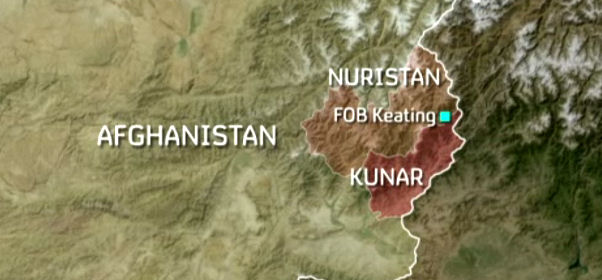COP Keating: Afghan war’s terrifying reality
Channel 4 News exposed the ‘crucible of conflict’ at US Combat Outpost Keating in Afghanistan – one of the most dangerous bases for US forces. Just weeks later it was closed.
The remote US Combat Outpost Keating was one of America’s most besieged bases, isolated in a ruthless valley near the Pakistani border. But just before troops could be pulled out, the base suffered one of its worst ever attacks.
On Saturday 3 October 2009, eight US soldiers were killed and another 22 injured in the attack.
A further eight Afghan soldiers were injured along with two Afghan security guards. The US withdrew so quickly after the attack they left behind some ammunition.
“We’re sitting in a bowl so we are constantly under observation.” Cpt Melvin Porter
According to the New York Times, the depot was promptly looted by insurgents and bombed by American planes to destroy the munitions.
Weeks earlier, Channel 4 News Asia Correspondent Nick Paton Walsh was embedded with US troops there for four days.
It was hit every two to three days, he reported. At the time, the US already wanted to leave, but struggled to see how, without handing a propaganda victory to the Taliban.
Captain Melvin Porter, 4th Infantry Division, US Army, said: “We’re sitting in a bowl so we are constantly under observation.”
This is how the war went at COP Keating: a few pot shots from the Taliban met with overwhelming American firepower.
“It’s general dushbaggery,” a soldier said of one attack.

Nick Paton Walsh’s exclusive report shows the challenges the Americans faced. The base was hard to resupply, with some helicopter pilots refusing to land and each flight requiring gunship escort.
The Afghan national police complained they did not have bullets to fight with, and were yet to be supplied to them by the Americans.
“They just take pot shots at us. Nothing special. They’re just trying to f*** with your life.” US soldier
The Latvian soldiers charged with training the Afghan army complained their recruits were of a low quality, and that the demand from Washington to double the size of the army within a year could lead to quality problems.
History of COP Keating
US Combat Outpost Keating was set up in 2006 in the Kamdesh district of Nuristan Province.
The troops based there were given the task of finding allies among local residents, linking them with central government in Kabul, deterring insurgents and stopping illegal movement across the border with Pakistan.
But the small outpost was isolated and overlooked by higher terrain. Supplies could only be sent in by helicopters, mainly at night. Its poor security position soon became apparent, but giving up the base would have been seen as a victory for the Taliban.
When Nick Paton Walsh arrived in the summer of 2009, the soldiers reported 35 insurgent attacks in just under three months.
After General Stanley McChrystal took command in Kabul in 2009, he changed the strategy and moved to concentrate forces where they could have a greater effect.
COP Keating and several other small bases were ordered to close.
But the insurgents struck COP Keating before it could be shut, killing eight US soldiers.
'Watching the war from Nuristan's idyllic valley'
We asked if they have a nickname for it: COP Keating, an American outpost trapped in the middle of a hostile valley in Nuristan province.
"They didn't, they replied - didn't need to. The word Keating (the surname of a first lieutenant who died near here) told them what it was about.
"A rocket-propelled grenade into the canteen. One into the roof of the barracks. One into the barriers. Taking a piss is dangerous: the tubes that act as urinals are in full view of one of the hills from which insurgents fire, and an Afghan soldier was shot dead there by a sniper.
"COP Keating gives you a bleak window onto America's future in Afghanistan. There is - in all honesty, most soldiers there admit - no real point to the base other than having a base there.
"We got a very small glimpse of the sort of violence meted out here. One Afghan patrol was returning when several shots rang out. They passed close: one hit the floor next to our cameraman Stuart Webb, causing fragments of rock to fly up into the leg of a Latvian soldier next to him, who was training the Afghans. He fell over, onto Stuart."
Read more from Nick Paton Walsh